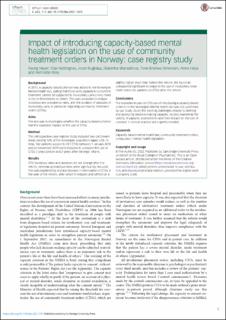Impact of introducing capacity-based mental health legislation on the use of community treatment orders in Norway: case registry study
Høyer, Georg; Nyttingnes, Olav; Rugkåsa, Jorun; Sharashova, Ekaterina; Simonsen, Tone Breines; Høye, Anne; Riley, Henriette
Journal article, Peer reviewed
Published version
Permanent lenke
https://hdl.handle.net/11250/2998542Utgivelsesdato
2022Metadata
Vis full innførselSamlinger
Originalversjon
Høyer, G., Nyttingnes, O., Rugkåsa, J., Sharashova, E., Simonsen, T. B., Høye, A. & Riley, H. (2022). Impact of introducing capacity-based mental health legislation on the use of community treatment orders in Norway: case registry study. BJPsych Open, 8(1), Artikkel e22. https://doi.org/10.1192/bjo.2021.1073Sammendrag
Background: In 2017, a capacity-based criterion was added to the Norwegian Mental Health Act, stating that those with capacity to consent to treatment cannot be subjected to involuntary care unless there is risk to themselves or others. This was expected to reduce incidence and prevalence rates, and the duration of episodes of involuntary care, in particular regarding community treatment orders (CTOs).
Aims: The aim was to investigate whether the capacity-based criterion had the expected impact on the use of CTOs.
Method: This retrospective case register study included two catchment areas serving 16% of the Norwegian population (aged ≥18). In total, 760 patients subject to 921 CTOs between 1 January 2015 and 31 December 2019 were included to compare the use of CTOs 2 years before and 2 years after the legal reform.
Results: CTO incidence rates and duration did not change after the reform, whereas prevalence rates were significantly reduced. This was explained by a sharp increase in termination of CTOs in the year of the reform, after which it reduced and settled on a slightly higher leven than before the reform. We found an unexpected significant increase in the use of involuntary treatment orders for patients on CTOs after the reform.
Conclusions: The expected impact on CTO use of introducing a capacity-based criterion in the Norwegian Mental Health Act was not confirmed by our study. Given the existing challenges related to defining and assessing decision-making capacity, studies examining the validity of capacity assessments and their impact on the use of coercion in clinical practice are urgently needed.

